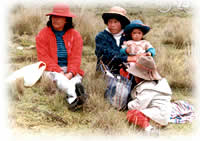 |
 |
||
 |
|||
|
RELATED THEMES education gender identity migration social change OTHER LOCAL THEMES BACKGROUND |
social relationships
As with other collections there are the usual feelings among the elderly that the younger generation don't respect them as much. Some say young men and women form relationships without seeking approval from their elders. There has been some shift in relations between men and women, although while men tend to say things have improved, many women assert that machismo is alive and well. On the whole the greatest change is that a primarily rural population, which had a tradition of communal labour, and of community membership with clear rights and responsibilities, is becoming a community of waged employees, with a high level of out-migration. It is not necessarily that people became less inclined to work together, but the conditions which made communal ownership and activities the most sensible economic options changed. And even though mining as an occupation is becoming much less common, its legacy remains. Changed livelihoods, lost social customs, shifts in attitude - these are not easily reversed. quotes about social relationships"In La Oroya, everyone in the neighbourhood is friendly... You go out and everyone knows you. In fact you have to be cautious because if you do something wrong everyone finds out. You could say one is a bit controlled. But, the people over there are good, more so than in Lima. Lima is tough. Here [in Lima] they take advantage of you, they look for your weak points. There, though, it's different, people are good; they like you the way you are. People respect each other, they greet you, there's a good morning, a good afternoon. Here [in Lima] there's none of that. Sometimes they don't even say hello." "[Young people] were quite quiet, quite modest [in the past] - now, on the other hand they're more awake. They know more, even the small ones are more lively and all kinds of things are going on. That's why my little boy, even at his tender age, wants to join the band and all that. [But] there's no respect now, nothing. Now they're all bad, rude, and neither greet or respect their elders. Before at least we were respectful, we knew how to address older people." ". first, the suitor had to prove his worth, vara as we say here; in those days he had to have a number of references, guarantees from respected members of the community. If he.had no guarantor, he would not be accepted as a future son-in-law and he couldn't have his bride. Marriage proposals aren't like that any more. You don't have to have guarantors; things are much more relaxed. You just meet someone and after a while you get together and ask for consent from the parents... There are hardly any marriages these days anyway. That's a big change, an almost 100% turn around, a huge change as far as I'm concerned. There's no more respect for the old custom." |
|
 The stress on community solidarity in these interviews is striking. Bonds are strong - even when people migrate to Lima and other cities, narrators say they stay in contact with each other, and meet up regularly. This is obviously in part a way to cope with loneliness, and even some hostility from urban dwellers to country folk, but also because such networks are of great practical help to new arrivals. Those who have spent time in the cities contrast the way people relate to each other there with the warmth and friendliness of Cerro de Pasco. Speaking from experience one man says:
The stress on community solidarity in these interviews is striking. Bonds are strong - even when people migrate to Lima and other cities, narrators say they stay in contact with each other, and meet up regularly. This is obviously in part a way to cope with loneliness, and even some hostility from urban dwellers to country folk, but also because such networks are of great practical help to new arrivals. Those who have spent time in the cities contrast the way people relate to each other there with the warmth and friendliness of Cerro de Pasco. Speaking from experience one man says: